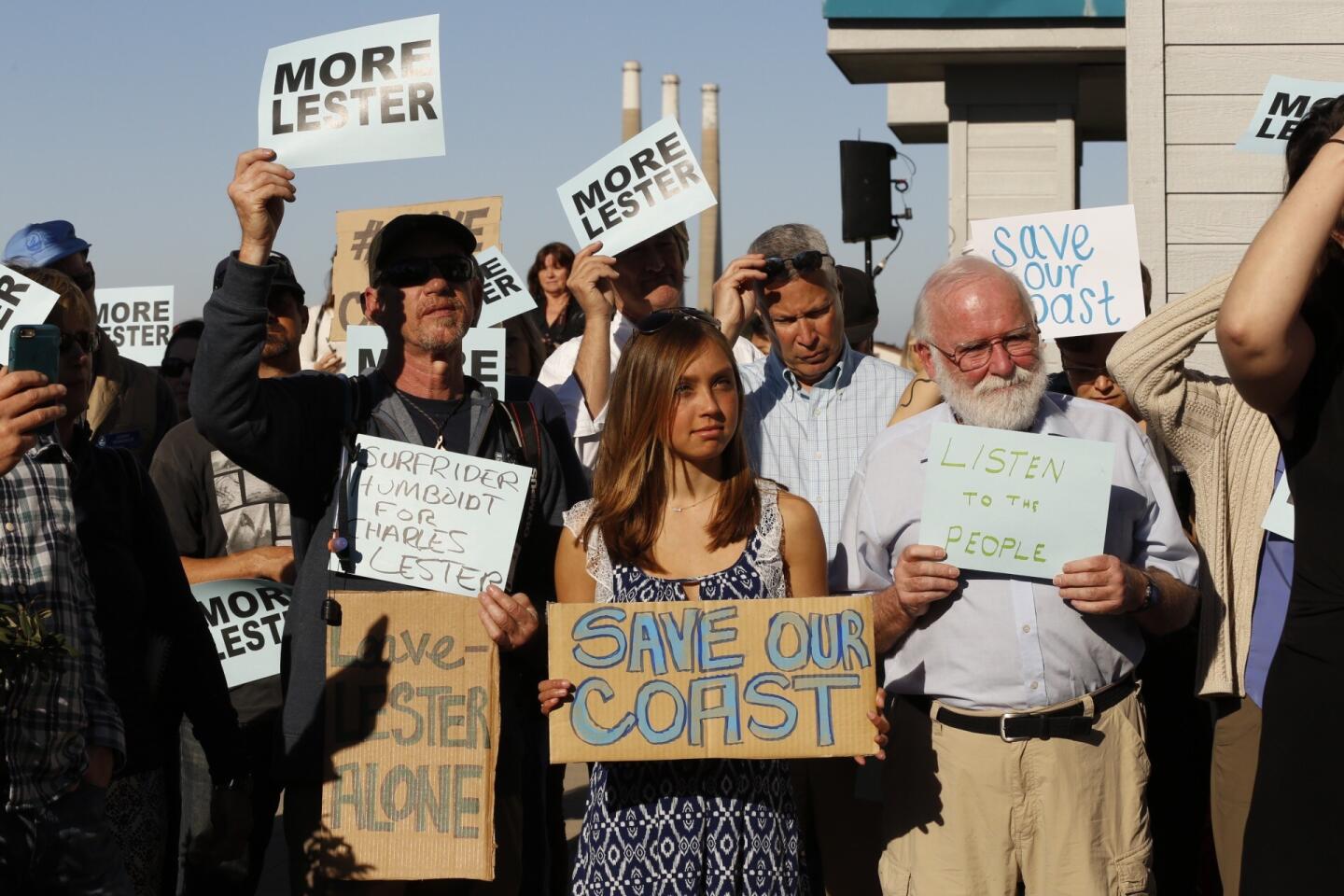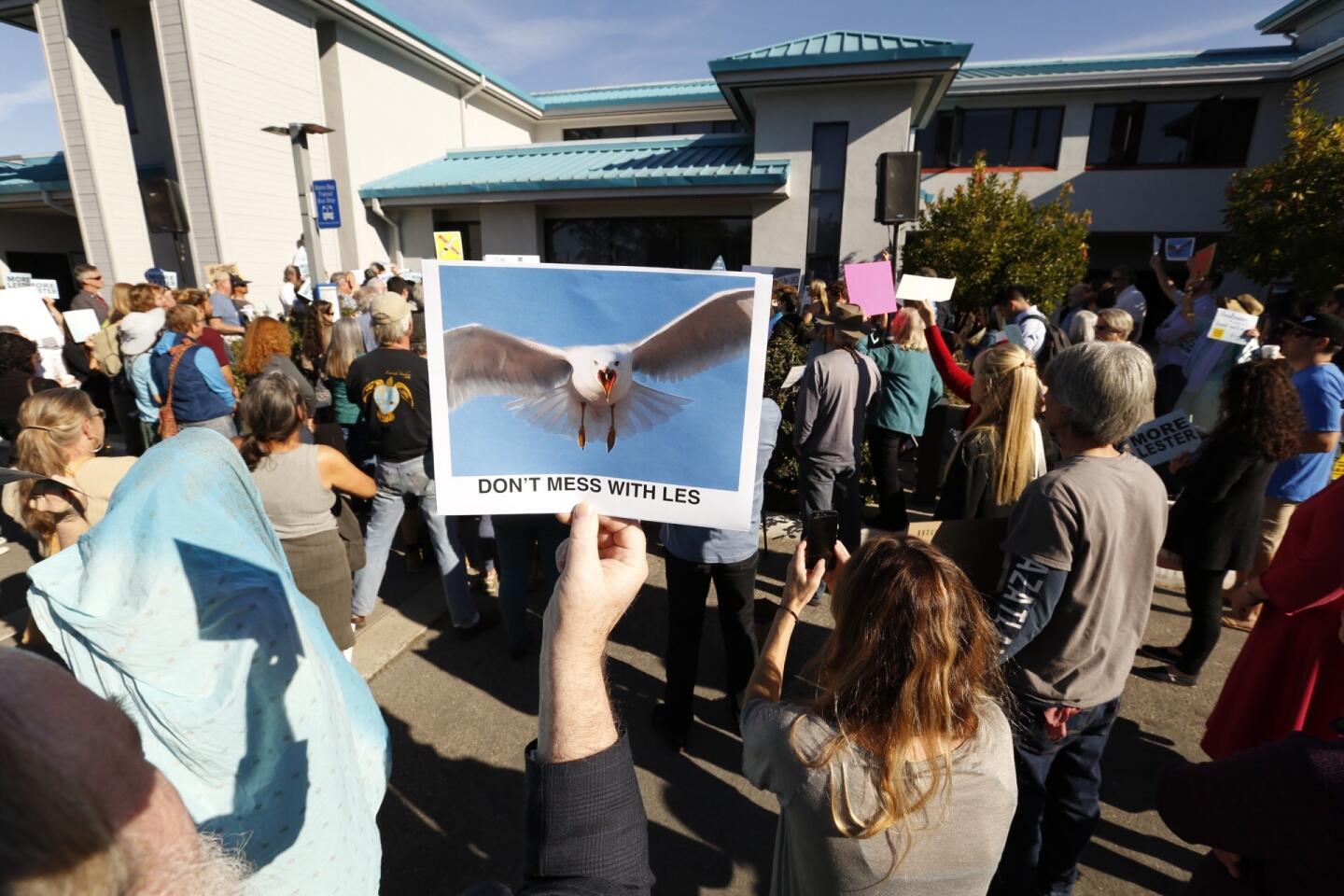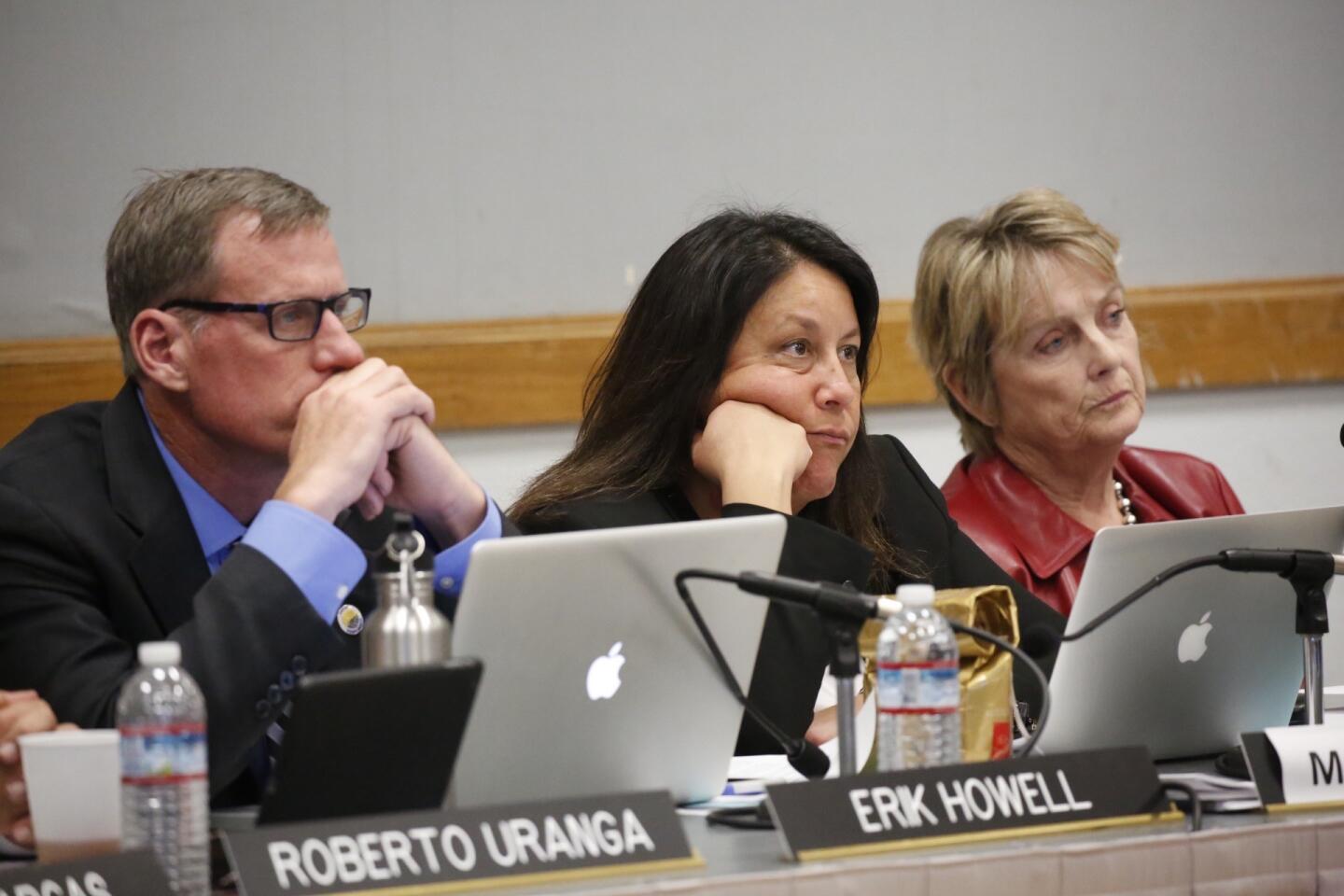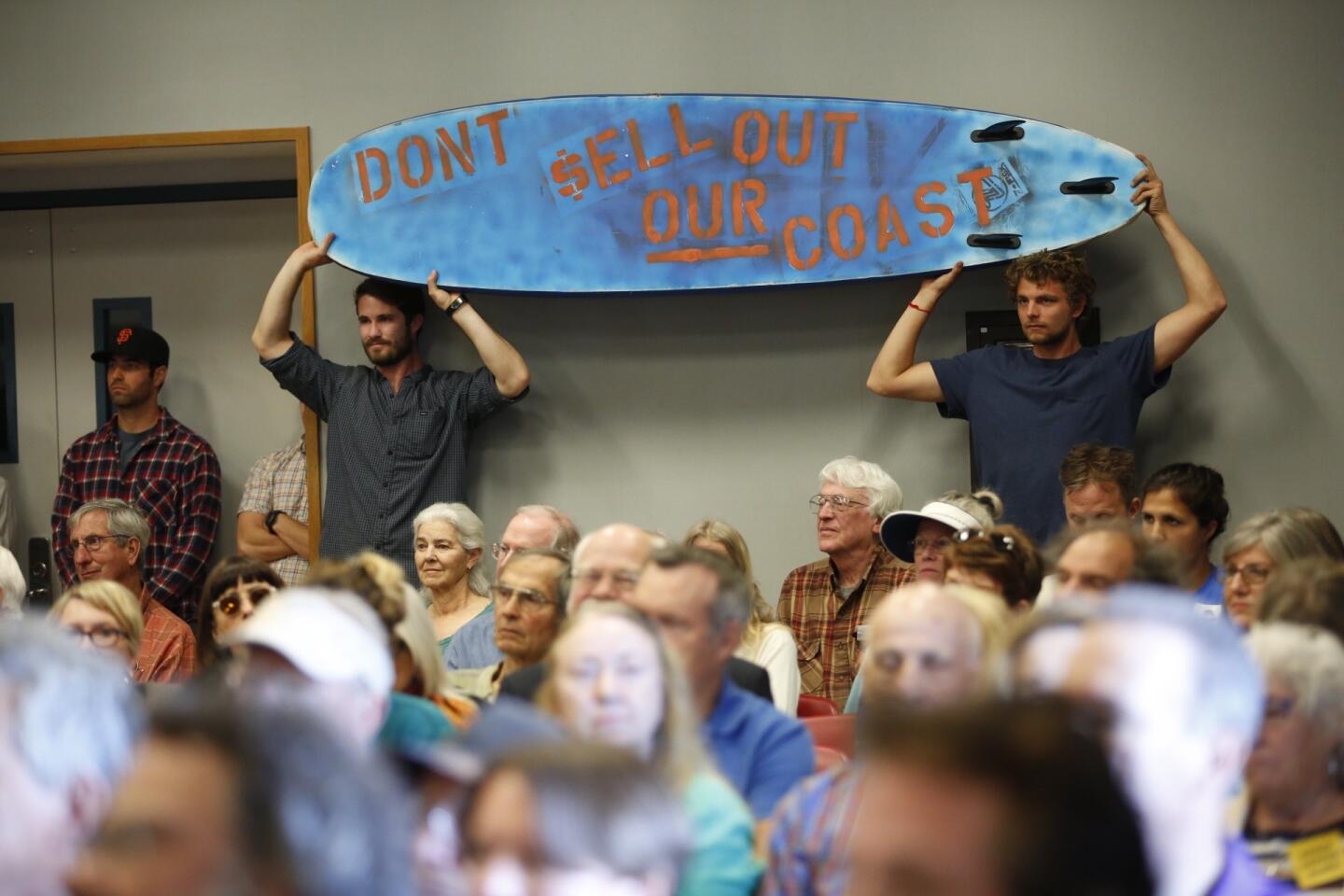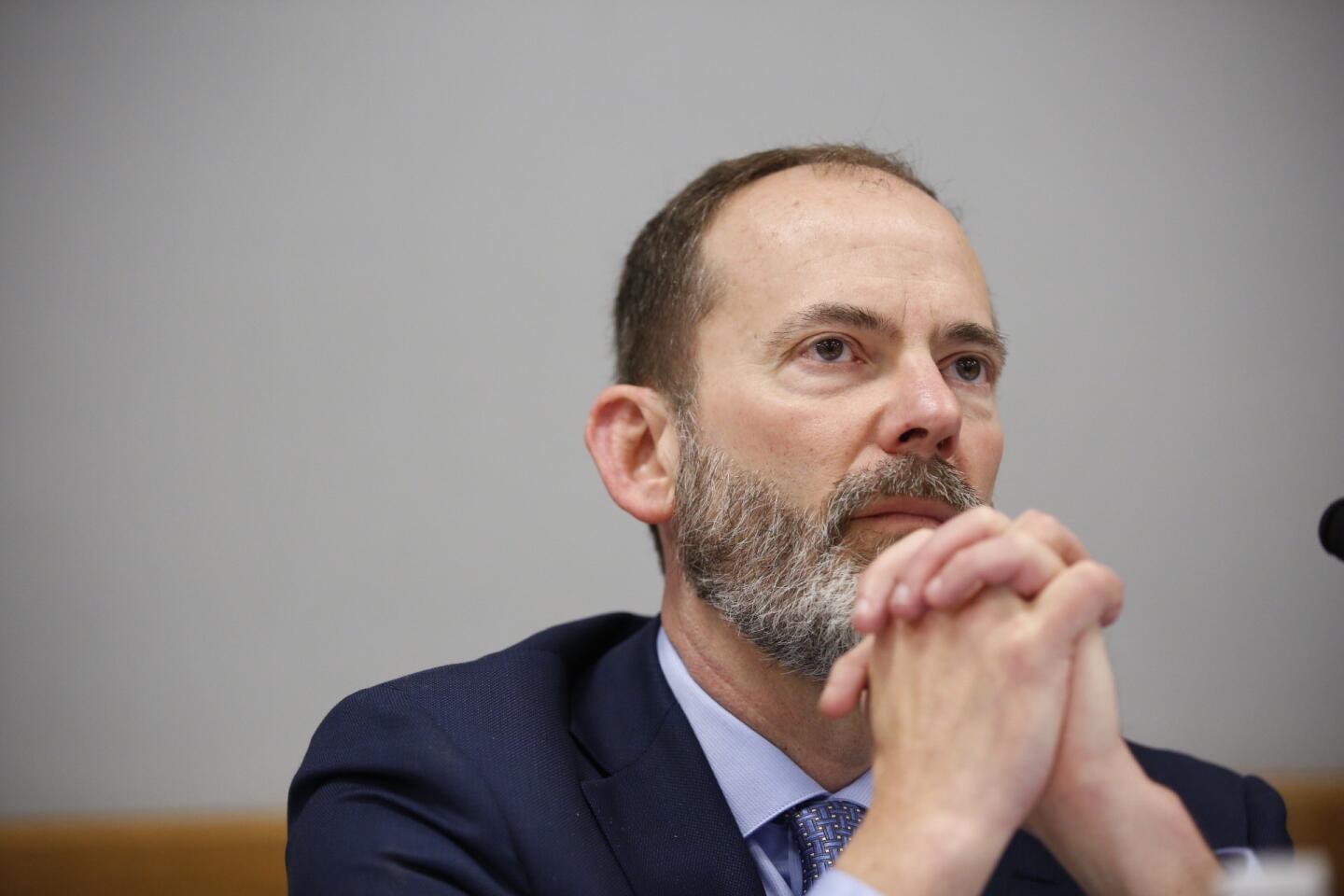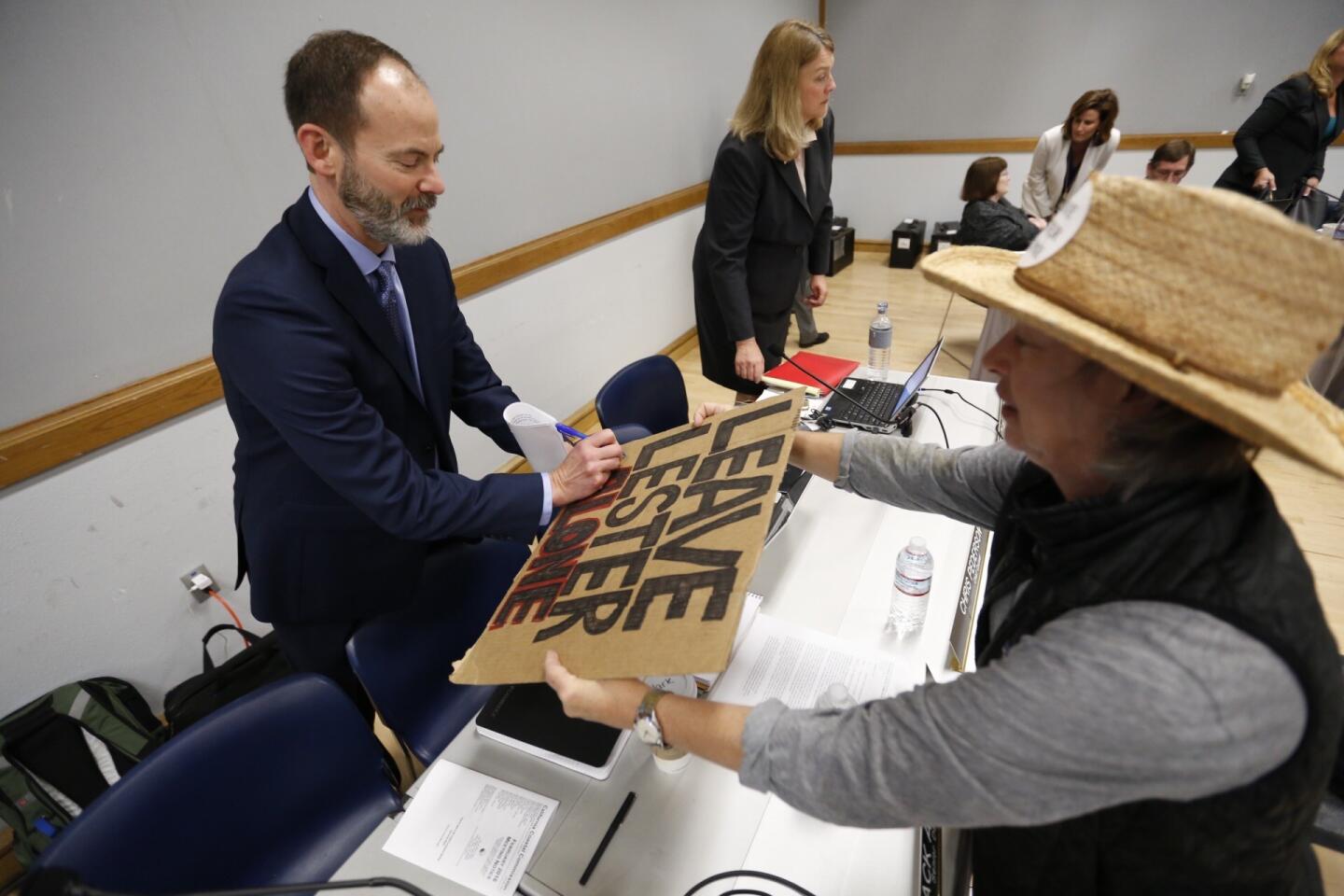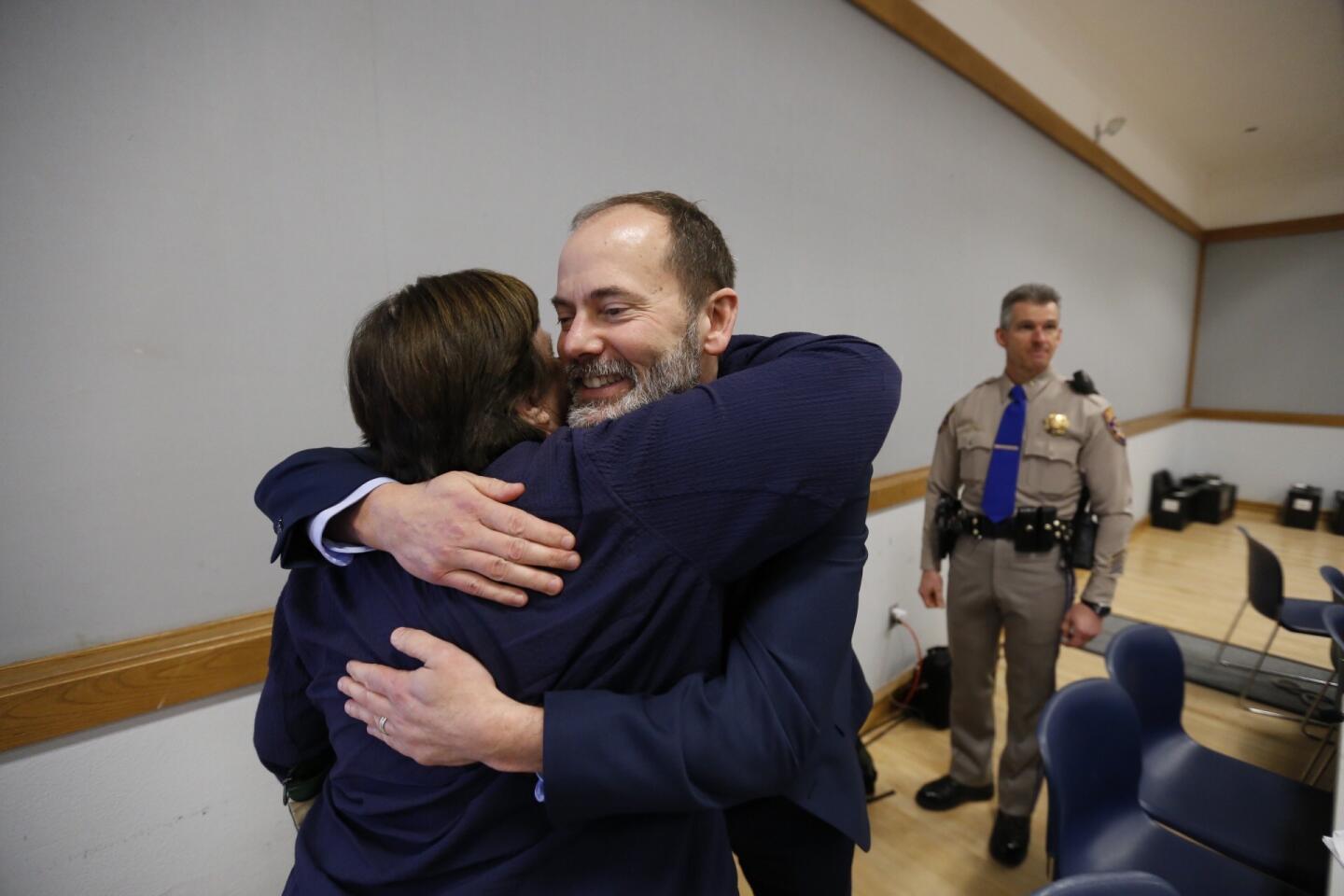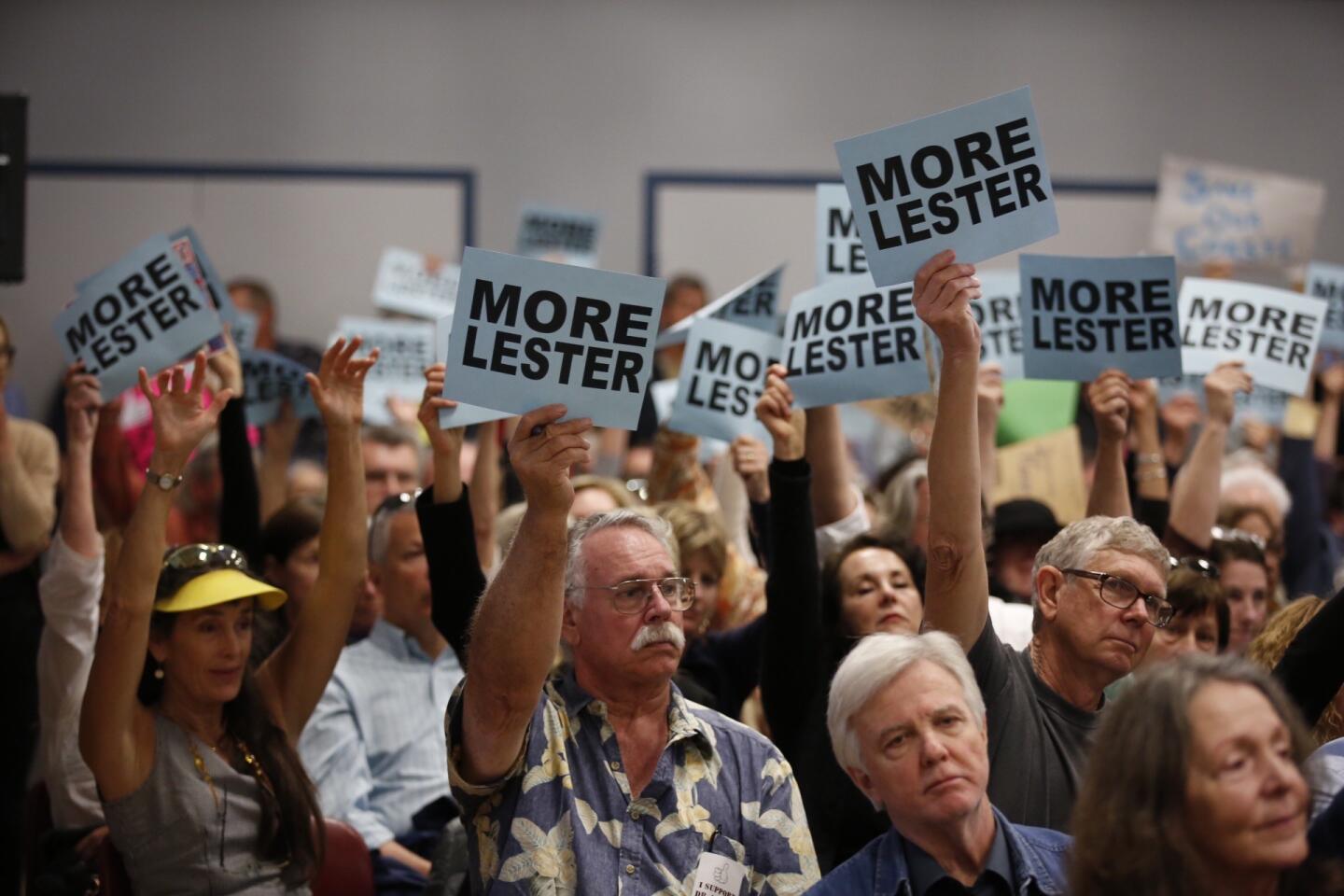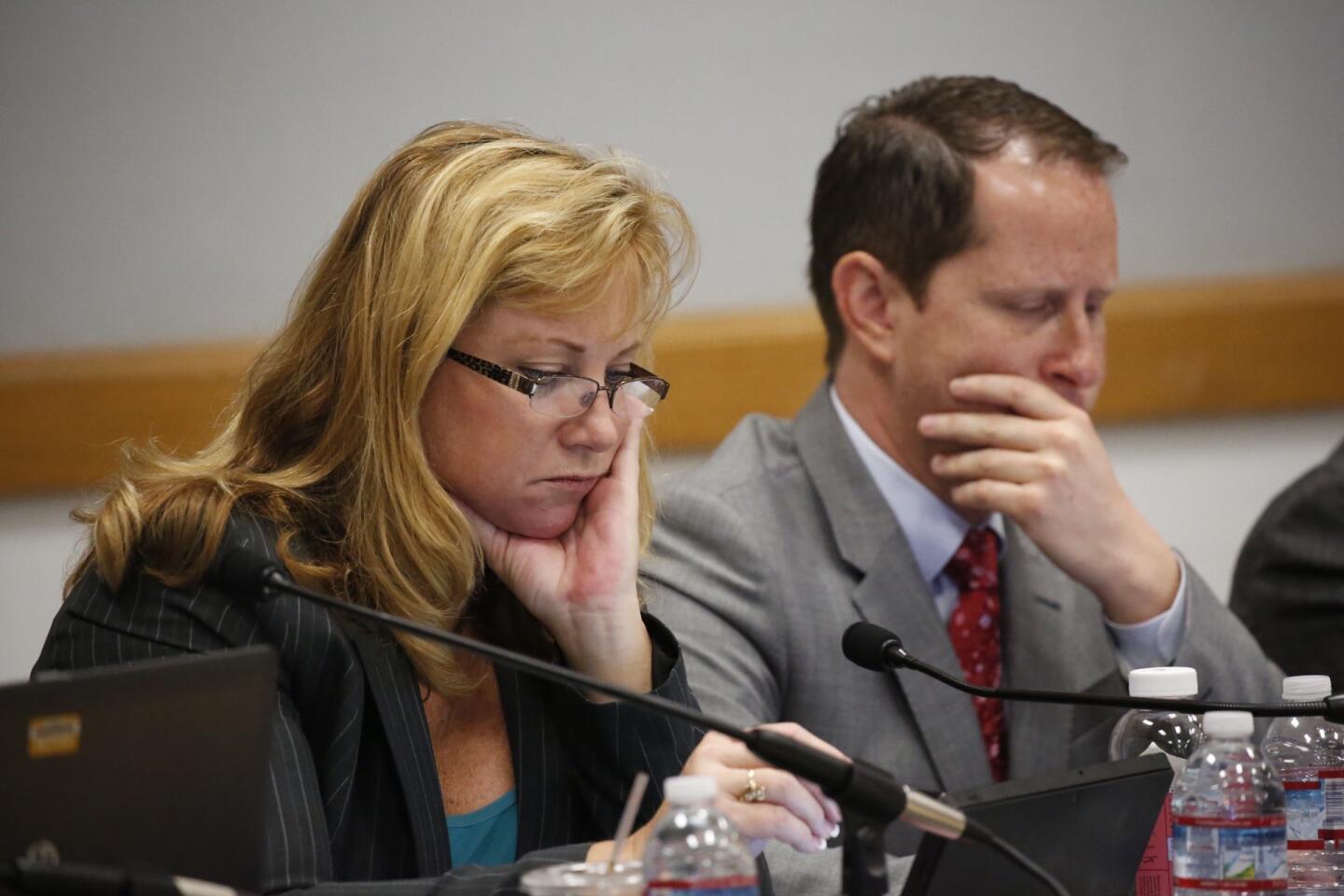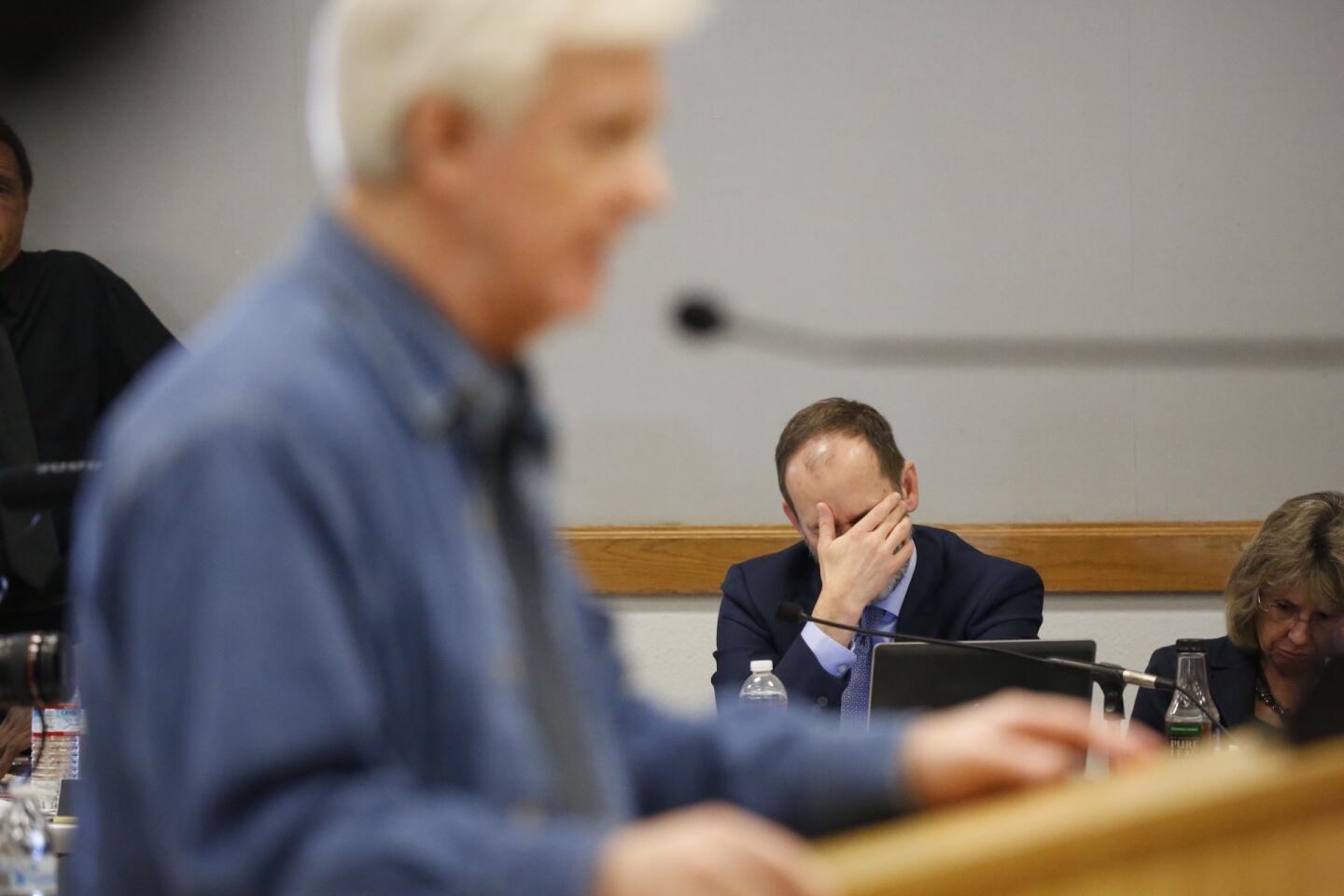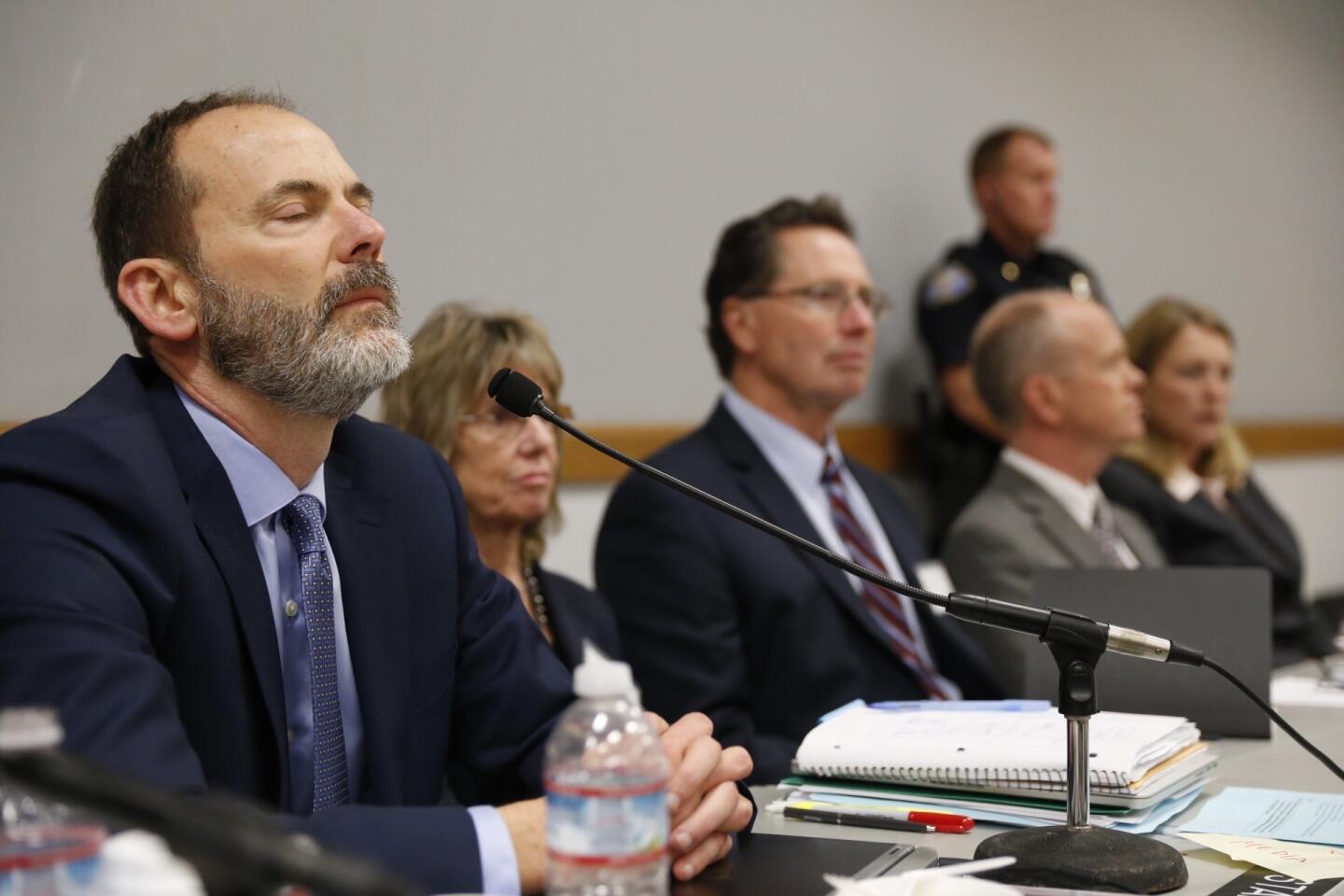Firing of Coastal Commission chief Charles Lester leaves deep divisions

The California Coastal Commission’s decision to fire its executive director, Charles Lester, after closed-door deliberations sparked outrage by environmentalists and is expected to leave deep divisions.
- Share via
reporting from Morro Bay, Calif. — The California Coastal Commission’s decision late Wednesday to fire its executive director, Charles Lester, after closed-door deliberations sparked outrage by environmentalists and is expected to leave deep divisions.
Many of the more than 100 Lester supporters awaiting the decision broke into tears or reacted angrily.
During an emotional meeting before the vote, many speakers warned that replacing Lester would send a powerful signal to staff to be more accommodating to development.
Join the conversation on Facebook >>
“It’s disgraceful that the commissioners voted in secret to fire Dr. Lester,” Steve Jones, oceans communications specialist for the Center for Biological Diversity, said in a written statement. “This isn’t over.”
Assembly Speaker Toni G. Atkins (D-San Diego) tweeted: “Let me apologize to the public. I truly thought my appointees would be better stewards of the coast.”
The environmental group Heal the Bay issued a statement saying Lester’s “firing is representative of a larger issue about the future of California’s coastline. The vote raises the question of what the Coastal Commission’s vision is for California’s coast.”
The panel disclosed that it voted 7 to 5 in a private session to dismiss Charles Lester, touching off an emotional scene unique in the agency’s 44-year history.
Several commissioners who voted against Lester were escorted out of the meeting by law enforcement without explaining their votes.
Commission chairman Steve Kinsey, who voted against the firing, called it a difficult decision that “revolved around leadership and not around an issue of greater flexibility for development” along the coast, which many of the hundreds of supporters of Lester had claimed in seven hours of public testimony earlier in the day.
“The challenge we face now is to rebuild trust and to illustrate through our actions that we will live up to the ideals of the Coastal Act,” Kinsey said.
No other commissioners offered explanations following the vote. After giving Lester a moment to speak, they adjourned.
Commissioners Olga Diaz, Erik Howell, Wendy Mitchell, Effie Turnbull-Sanders, Mark Vargas, Martha McClure and Roberto Uranga voted to fire Lester. Voting no were Carole Groom, Mary Shallenberger, Kinsey, vice chair Dayna Bochco and Mary Luevano.
The dismissal takes effect immediately, with Senior Deputy Director Jack Ainsworth leading the agency until the commission selects an interim and permanent replacement.
In his remarks after the vote, Lester said, “It’s been a privilege to serve the commission for the past 4½ years. If there is a silver lining, I’ve been energized by all the people who came together on this.”
His comments drew sustained applause from the audience.
In an interview later, Lester said he heard nothing from commissioners during the hearing that went beyond organizational issues he thought they would work through to resolve.
FULL COVERAGE: Firing of the California Coastal Commission executive director >>
He said he went out of his way to address concerns about the agency’s process, staff diversity and communication with commissioners.
“I don’t know, maybe they just thought I was too independent,” Lester said.
Commissioners took the action in closed session because they said they were bound by law to honor Lester’s right to privacy.
But their reasoning did not align with advice from the agency’s chief counsel, who told the panel they were free to discuss any current issues involving Lester’s performance because he had chosen a public hearing to defend himself.
Before moving into closed session, several commissioners were critical of media reports, fueled by coastal activists and environmental groups, that attributed the move to fire Lester to a desire for more coastal development.
Commissioners said the reports were baseless and damaged the reputation of the agency.
“This created an atmosphere of public distrust,” said Commissioner Vargas. “We need to set the record straight. There was no coup by developer interests.
“But this is like trying to convince people that the fluoride in their water was not a communist plot,” Vargas said.
Some commissioners alluded in general to unhappiness with Lester.
Vice chair Bochco said commissioners have had problems getting information from the commission’s staff, had not been included in agency processes and were often left in the dark about how staff had come to conclusions related to projects.
“I would like to discuss with the press the reasons we are here,” Bochco said. “It is not about developers and their consultants. We have been terribly mischaracterized as developer hacks.”
Commissioners Groom and Shallenberger defended Lester and praised him for a long list of achievements, including the development of a strategic plan for the agency, efforts to address sea level rise, increasing the budget by $3 million and good cooperation with local governments.
“He leads by accomplishment,” Groom said. “Month after month after month we have some 60 issues to deal with. To do this work there is leadership at the top and the bottom.... The proposal to replace our executive director is absolutely wrong.”
Speakers included officials from local governments up and down the coast, representatives of state legislators, commission staff members, environmental organizations and Fred Collins, an administrator for the Northern Chumash Tribal Council, who implored the commission to protect “grandmother ocean.”
“You’re getting killed here today,” former commission chief counsel Ralph Faust told commissioners. He urged them to make their decision in public, adding that “whatever it is, own it and defend it.”
In the past, some commissioners said that Lester is lacking in management and leadership skills and that they have trust and communication problems with him and staff.
They say the planning and approval process is far too long and burdensome for developers.
His critics say the problems have existed since 2011, when about half the commission was replaced.
Lester was notified in writing Jan. 14 that the commission would consider his dismissal. The panel gave him the option of resigning or having a public hearing to determine his future. He chose the latter and he defended his record in remarks that opened the hearing.
Lester, who replaced longtime Executive Director Peter Douglas five years ago, said he remained the best person to lead the powerful agency in its mission to shape land use and protect the environment along the coast.
He backed his work and that of staff to preserve coastal resources and public access in the face of rising seas, a growing population and increasing development pressure.
“Our beaches are a critically important public commons to be enjoyed by all Californians,” Lester said. “Many of our beloved beaches could be lost -- squeezed out between the rising seas and shoreline development.”
He highlighted his experience and commitment as a public servant protecting the state’s 1,100-mile shoreline under the 1976 Coastal Act.
In a highly charged environment, Lester said, the independent, 160-member staff provides “impartial, objective and well-reasoned recommendations” that are crucial for political appointees on the panel to make proper decisions.
At least one big developer, the Pebble Beach Co., showed up to support Lester, praising him and the commission for their approval four years ago of a major development at the luxurious Monterey Peninsula resort after years of clashing over the proposal.
The letter from Chief Executive Bill Perocchi called Lester a “fair, pragmatic, creative, open and reasonable” director who balanced the needs of the company and the rights of the public.
Sonoma County Supervisor Efren Carrillo cited Lester’s “proven track record” and sensible approach.
He urged commissioners to “greatly consider your responsibility to future generations” and to place their coastal protection duties over politics or development pressure.”
A former chairman of the commission, Mel Nutter, said the way the hearing was structured -- with hours of public testimony before any commissioners uttered any criticisms of Lester -- was “totally backwards.”
“The public was asked in effect to present a defense against a set of charges that were never presented,” said Nutter, a Long Beach attorney. “It was totally backwards and that put the public at a huge disadvantage.”
The commission was back in session Thursday, and some critics of the firing are also in Morro Bay pressing their case.
dan.weikel@latimes.com | Twitter: @LADeadline16
tony.barboza@latimes.com | Twitter: @tonybarboza
MORE ON THE CALIFORNIA COASTAL COMMISSION
Coastal Commission chief defends his record as panel moves to fire him
Supporters of Coastal Commission executive director protest his proposed firing
Steve Lopez: When it comes to the California Coastal Commission, ‘cozy’ is a four-letter word
More to Read
Sign up for Essential California
The most important California stories and recommendations in your inbox every morning.
You may occasionally receive promotional content from the Los Angeles Times.
